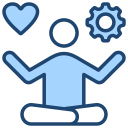
Mindfulness and Resilience Building Web-based Programs
Discover how web-based programs can empower individuals and organizations to cultivate mindfulness and resilience in today’s fast-paced digital world. These innovative online offerings combine evidence-based practices, interactive content, and flexible access to help users navigate stress, enhance well-being, and build psychological strength. This page explores the foundations, benefits, core features, and impact of digital mindfulness and resilience training.
The Science Behind Mindfulness
The practice of mindfulness is grounded in decades of scientific research that highlights its positive impact on mental and physical health. Regular mindfulness exercises demonstrate measurable changes in brain structure and function, including increased gray matter density in regions linked to emotion regulation and self-awareness. These changes contribute to lower stress, improved focus, and a greater sense of calm. Web-based mindfulness programs draw from these findings to offer users validated techniques that are both practical and transformative, helping people develop lifelong habits to support well-being.
Principles of Resilience
Resilience is not just a trait but a dynamic skill that can be cultivated and strengthened over time. It arises from a combination of emotional awareness, adaptability, optimism, and supportive relationships. With online platforms, users can engage in exercises and scenarios that mirror real-life adversity, helping them hone these principles in a safe and supportive environment. The immersive nature of digital resilience training encourages individuals to develop a growth mindset, understand personal triggers, and practice positive coping strategies in diverse situations.
Integrating Mindfulness and Resilience
Effectively blending mindfulness and resilience practices creates a powerful toolkit for enduring stress, fostering creativity, and facilitating recovery from setbacks. Web-based programs often integrate these approaches through guided meditations, reflective exercises, and interactive feedback. This integration enables participants to cultivate present-moment awareness while simultaneously building their capacity to bounce back from difficulties. The synergy between mindfulness and resilience, enhanced by digital accessibility, lays the groundwork for lasting personal and professional transformation.
Key Benefits of Web-based Training
One of the most significant advantages of web-based programs is their accessibility. Individuals from various geographic locations, life stages, and backgrounds can participate without the obstacles of travel or rigid schedules. The asynchronous nature of many platforms allows users to progress at their own pace and return to content as needed for reinforcement. This flexibility opens the door for busy professionals, students, and caregivers to incorporate mindfulness and resilience practices into their daily routines without compromising existing responsibilities.
Digital programs can be tailored to meet the specific needs and preferences of each user. Personalized assessments, progress tracking, and adaptive content ensure that participants remain engaged and challenged throughout the process. Gamification elements, such as achievements and feedback loops, further increase motivation and learning retention. By leveraging data and user feedback, web-based platforms continuously refine their offerings, making the journey toward mindfulness and resilience both enjoyable and impactful.
Web-based training programs are inherently scalable, making it possible to extend high-quality resources to large groups—whether workplaces, educational institutions, or communities. Built-in forums, group challenges, and real-time support from coaches or peers foster a sense of belonging and accountability. This collective experience not only boosts individual outcomes but helps create a supportive culture centered around well-being and growth. The community aspect of these platforms ensures that users never feel isolated in their journey, harnessing the power of shared progress.

